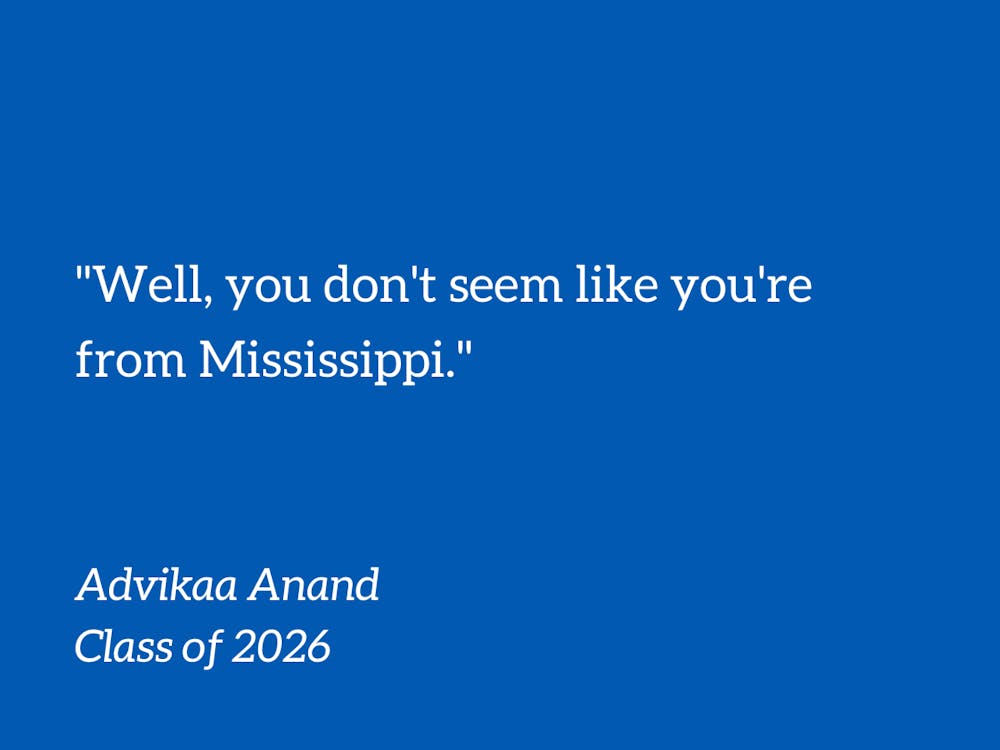“Well, you don’t seem like you’re from Mississippi,” he said dismissively, as we sat carelessly tossing playing cards into the center of the table in front of us. If I hadn’t known this boy for only a few hours, I might’ve mustered the words to express my bewilderment at his statement. Yet his comment was one to which I had become numb, an expected retort when I shared with someone where I was from.
Perhaps others convey such shock because they have a particular visage of Mississippi’s people ingrained in their minds, all of which my dark eyes, dark skin, and darker hair betray. Or perhaps it’s because Mississippi seems like an American fantasy, only present when they are told to count in seconds or when they delve into our country’s sinister racial history within the confines of the classroom.
But mostly, it’s because Mississippi, like its name, has an unspoken complexity to itself, one that is understood to be inextricably linked with our national identity. America is the land of unfettered dreams, but Mississippi is an aberration in that flawless legacy. America is the land of equal opportunity, but Mississippi is emblematic of festering inequality. America is the land of social mobility, but Mississippi's social structures are deeply entrenched within the state’s fertile soil. This heaviness looms on the state’s consciousness, producing a pressing obligation, and even urgency, for racial reconciliation.
The ever-lingering consequences of slavery pervade the state’s sociopolitical climate. The total banning of abortion rights in Mississippi has disproportionately impacted women of color, who, often residing in impoverished communities, have little access to proper sex education and contraceptives. The Centers for Disease Control and Prevention reported that Black and Hispanic women made up a majority of women obtaining an abortion in 2019, with the abortion rate standing at 23.8 per 1000 women for Black women and 11.7 per 1000 women for Hispanic women— exceedingly high figures compared to the 6.6 per 1000 women abortion rate for white women.
More recently, the Jackson water crisis revealed just how pervasive systemic racial divides remain in the state., with historically Black neighborhoods bearing the brunt of the city’s failing infrastructure. After historic floods incapacitated Jackson’s main water treatment system, the majority-Black city has discolored water flowing into its sinks, and citizens are instructed to boil all water before using it for cooking, drinking, or even bathing. The need to buy unprecedented amounts of bottled water has imposed new financial strains on families who were already struggling to make ends meet. Moreover, the crisis has been isolated in the city, while the majority white suburbs escape unscathed.
The consequences of Mississippi’s complex racial history are not confined to sociopolitical levels; they trickle down into our personal lives. Growing up as one of three brown kids in my grade, I often found myself straddled between my Black and white classmates, burdened by the task of resolving outstanding racial tensions. As students of color, we often found ourselves explaining the importance of having conversations about racial trauma to our classmates, who cringed at the discomfort they felt when they were made aware of their racial privilege. They complained that such discussions create nonexistent boundaries along racial lines when really, they were only being made actively aware of what had always existed.
Such conflicts are indicative of a constant tension that brews below the surface. We can sense it when we brace ourselves for a racially motivated comment whenever we interact with someone who doesn’t look like us or when we expect efforts at racial reconciliation to inevitably backfire. These feelings generate a caustic antipathy to any effort made in the right direction and produce a fierce stubbornness against facilitating progress on both sides.
And yet, here at Duke, there is no identity that defines me more than being a Mississippian. It is all the state’s various blemishes and inconsistencies that have given me a unique appreciation for people’s various differences. It has given me a fierce motivation to dive beyond the surface level and discover the stories that make people who they are. But above all, it has given me a core appreciation for our common humanity—that we are unnecessarily embattled by our differences when we should be emboldened by our similarities. When we recognize these commonalities, the progress that can be achieved is unrivaled.
So to begin to repair yourself, America, you must embrace the Mississippian parts of yourself—the parts that jut out as jagged reminders of your fractured past and the parts that remind you of who you are: not yet unsalvageable and forever unfinished.
Advikaa Anand is a Trinity freshman. Her columns run on alternate Thursdays.
Get The Chronicle straight to your inbox
Signup for our weekly newsletter. Cancel at any time.
Advikaa Anand is a Trinity sophomore and an opinion managing editor of The Chronicle's 119th volume.

